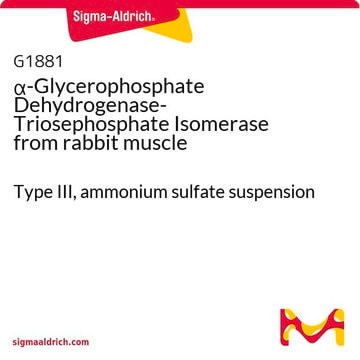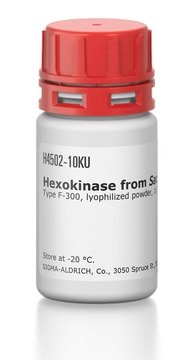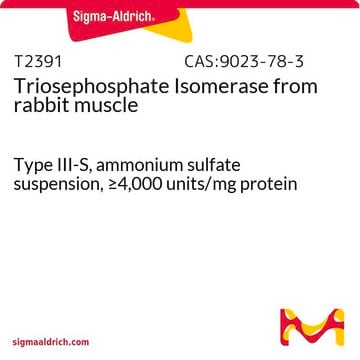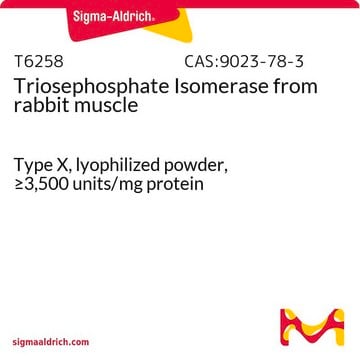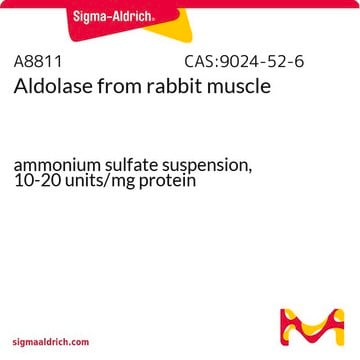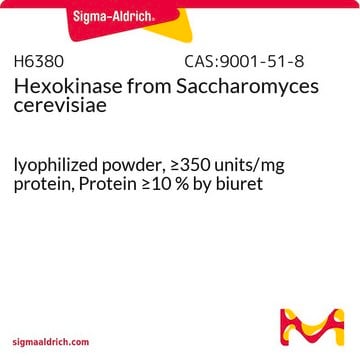F0137
Fructose-6-phosphate Kinase from Bacillus stearothermophilus
Type VII, lyophilized powder, ≥50 units/mg protein
Synonim(y):
6-Phosphofructokinase, ATP:D-fructose 6-phosphate 1-phosphotransferase
Zaloguj sięWyświetlanie cen organizacyjnych i kontraktowych
About This Item
Polecane produkty
typ
Type VII
Postać
lyophilized powder
aktywność właściwa
≥50 units/mg protein
masa cząsteczkowa
34 kDa
Warunki transportu
wet ice
temp. przechowywania
−20°C
Opis ogólny
Fructose-6-phosphate kinase from Bacillus stearothermophilus, a 34 kDa enzyme, belongs to phosphofructokinase (PFK) - like superfamily. The glutamate 161 and arginine 162 residues at the active site are crucial for substrate binding.
Research Area: Cell Signaling
Bacillus stearothermophilus phosphofructokinase (BsPFK) is a homotetramer that is allosterically inhibited by phosphoenolpyruvate (PEP), which binds along one dimer-dimer interface.
Bacillus stearothermophilus phosphofructokinase (BsPFK) is a homotetramer that is allosterically inhibited by phosphoenolpyruvate (PEP), which binds along one dimer-dimer interface.
Zastosowanie
Fructose-6-phosphate Kinase from Bacillus stearothermophilus was shown to interact with neuronal nitric oxide synthase (nNOS) causing a defect in glycolytic metabolism and increased fatigability in dystrophic muscle.
Fructose-6-phosphate Kinase from Bacillus stearothermophilus has been used in the assay mixture for mass spectrometry assay for phosphoglucoisomerase (PGI) (G6P to F6P reaction).
Fructose-6-phosphate kinase from Bacillus stearothermophilus has been used:
- in steady state analysis of phosphofructokinase activity in the presence of ATP deuterated at the C8 position(C8-D ATP)
- for standard curve generation for quantifying muscle phosphofructokinase (PFK) activity
Działania biochem./fizjol.
Fructose-1,6-bisphosphatase (FBP) is an important enzyme in glucose metabolism. It catalyzes the hydrolysis of fructose-1,6-bisphosphate to fructose-6-phosphate and inorganic phosphate. Fructose-6-phosphate kinase converts fructose-6-phosphate into fructose 1,6-bisphophate in the rate limiting step of the glycolysis cycle.
Phosphofructokinase (PFK) is an essential bifunctional enzyme that serves as a critical regulator in the intermediate stages of glycolysis. PFK is strongly linked to caveolae and is brought to caveolae by caveolin-1 in vascular smooth muscle cells (VSMCs).
Definicja jednostki
One unit will convert 1.0 μmole of fructose 6-phosphate and ATP to fructose 1,6-diphosphate and ADP per minute at pH 9.0 at 30 °C.
Postać fizyczna
Lyophilized powder containing buffer salt (e.g. phosphate buffer, or Tris buffer with NaCl)
This page may contain text that has been machine translated.
Kod klasy składowania
11 - Combustible Solids
Klasa zagrożenia wodnego (WGK)
WGK 3
Temperatura zapłonu (°F)
Not applicable
Temperatura zapłonu (°C)
Not applicable
Środki ochrony indywidualnej
Eyeshields, Gloves, type N95 (US)
Certyfikaty analizy (CoA)
Poszukaj Certyfikaty analizy (CoA), wpisując numer partii/serii produktów. Numery serii i partii można znaleźć na etykiecie produktu po słowach „seria” lub „partia”.
Masz już ten produkt?
Dokumenty związane z niedawno zakupionymi produktami zostały zamieszczone w Bibliotece dokumentów.
Klienci oglądali również te produkty
Analysis of the phosphofructokinase subunits and isoenzymes in human tissues
G.A. Dunaway et al.
The Biochemical Journal, 251, 755-757 (1988)
M D Wallace et al.
Oncogene, 33(28), 3688-3695 (2013-08-27)
Defective DNA replication can result in genomic instability, cancer and developmental defects. To understand the roles of DNA damage response (DDR) genes on carcinogenesis in mutants defective for core DNA replication components, we utilized the Mcm4(Chaos3/Chaos3) ('Chaos3') mouse model that
Gamut of glycolytic enzymes in vascular smooth muscle cell proliferation: Implications for vascular proliferative diseases
Sarkar A, et al.
Biochimica et Biophysica Acta (BBA)-Molecular Basis of Disease, 167021-167021 (2024)
The role of the C8 proton of ATP in the regulation of phosphoryl transfer within kinases and synthetases
Kenyon CP, et al.
BMC Biochemistry, 12(1), 36-36 (2011)
[Pain treatment. Systematized education in epidural pain treatment].
I H Iversen
Sygeplejersken, 85(8), 24-31 (1985-02-20)
Nasz zespół naukowców ma doświadczenie we wszystkich obszarach badań, w tym w naukach przyrodniczych, materiałoznawstwie, syntezie chemicznej, chromatografii, analityce i wielu innych dziedzinach.
Skontaktuj się z zespołem ds. pomocy technicznej

